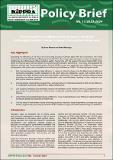| dc.description.abstract | Education plays an important role in driving social
and economic development, making it vital to ensure
that investments in this sector yield optimal returns.
Quality education is a major determinant of sustainable
development, and achieving universal access to
education is a key goal for governments worldwide. The
literacy rate improved from 61.5 per cent in 2007 to 78
per cent in 2021, which was attributable to improved
access to alternative education programmes, including
adult education programmes, free primary and day
secondary education.
Adult and Continuing Education Centres (ACEs) have
been instrumental in providing education opportunities
to out-of-school youth and adults in Kenya. As of 2017,
there were 1,845 full-time instructors and 3,000 parttime
instructors. The programme consists of 6,173 basic
centres and 202 secondary centres. The total number
of learners in ACEs totals 306,228, with 102,076 males
and 204,152 females (Ministry of Education 2018).
Additionally, there are five Multi-Purpose Development
Training Institutes (MDTIs) and 217 Community Learning
Resource Centres (CLRCs). The Directorate offers
Adult and Continuing Education through Basic Adult
Literacy Programme (BALP), Post-Literacy Programme
(PLP), Continuing Education Programmes (CEP) and
Community Education and Empowerment (CEE). The
number of ACE centres have experienced a gradual
decline from 2018 to 2019 and 2020, reaching 5,340,
5,161 and 4,932 in the respective years (Ministry of
Education 2020). | en |

